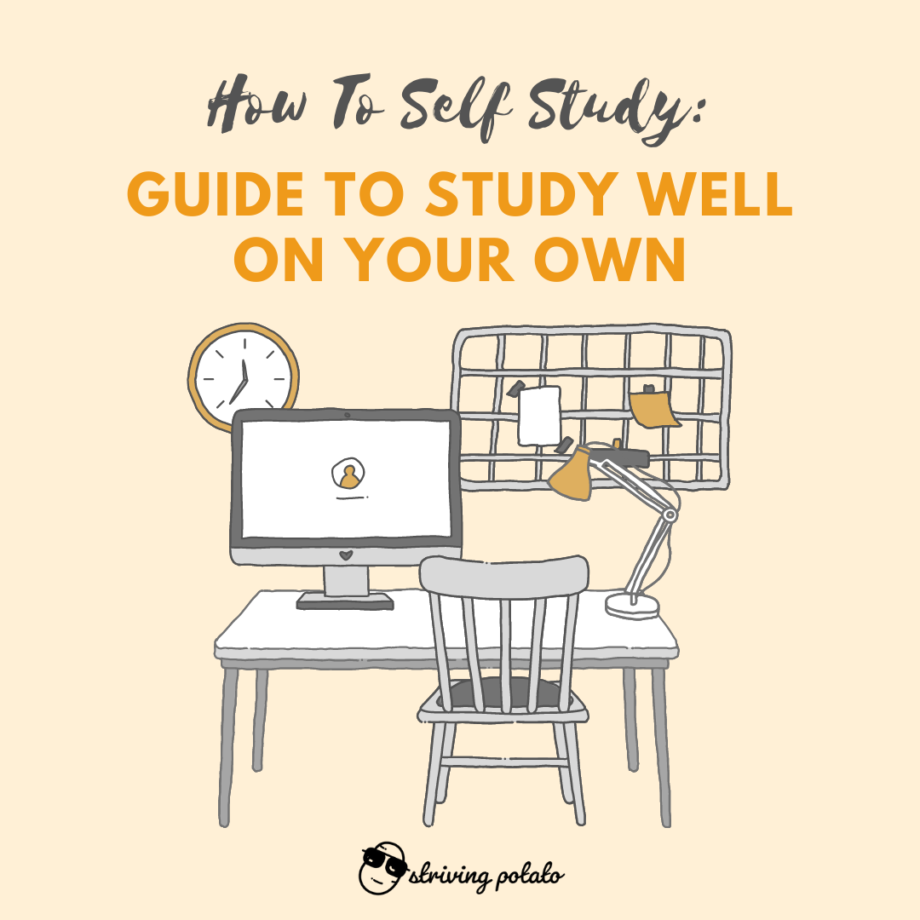
As the new semester begins, most of you have the same goal in mind: To do well in the exam. But somehow, most of the classes have been conducted online because of covid.
The online class is equal to sitting in front of the zoom session for 2 hours and realizing you forget to understand.
Sounds familiar? Yes, and you are not alone.
You are one of the victims of the online student syndrome, as I called it. The online class is not equal or as effective as the face-to-face session, I agree. But it doesn’t mean you are screwed.
One of the essential elements to do well during online learning is the ability to self-study or simply put, study on your own. Well, because you are most likely alone in your room with your laptop most of the time.
Even if it’s not for online learning, self-study is an important aspect to do well in your exam. But the problem is as you sit in front of your desk, you are wondering, how to do it? How to study?
Worry not my friend, here is a simple guide on how you can study well on your own.
In this year’s exam, you are going to be at the top of the class!
Table of Contents
Toggle1. Create a study plan
Create a structured plan on how you plan to do your self-study session. To do this there are 2 important steps:
- Step 1
identify first the hours you want to allocate for the study session and how far you are off with the exam?
For example, in a day, you can have about 2 hours to self-study and about 90 more days before the big exam. Mark in your planner or calendar as the timeline you are working with.
if you don’t set a specific and tangible target that include date and days, it will be quite difficult to stick to the study plan you created
- Step 2
Decide on whether the designated self-study session is for:
- preparation before coming to the class (Pre-class study session)
- revision after the class (post-class study session)
This is important as the way to approach the 2 study sessions are different
For preparation before class, the time spend should be lesser and the content is more concise. This may include drafting a simple mind map and skimming through the chapters of any reading material.
For revision, it might take a longer time. And this session will depend greatly on how you concentrate in class in the first place. Usually, if you are focused, and engaged during a learning session, the revision post-class will involve answering questions, or maybe further reading on things that had been discussed in the class.
So, in your study plan specify the hours slotted in for self-study session and whether it is for pre or post-class session
2. Categorized the topic based on the importance of the subjects
Identify which is the topic that is must know and which one is good to know. The must-know topic is generally the core principle for the understanding of the subject whereas the good to know is supplementary information that is needed for overall coverage of the subject. The must-know topic should be the priority of your learning session.
To identify these ‘must know’ or ‘good to know’ topics, discuss with your professor, teacher, or even with your senior. They can give you a rough idea of what to focus on in each topic.
This will help greatly especially for the subjects with heavy content. It will take some time to build in the knowledge and understand it. So, the fundamental understanding from the ‘must know’ topic should be there first.
Sometimes in class, your professor most likely mentioned the important topic or important concept, and this can be included in the ‘must know’ topic as well.
Slot this topic into the study planner according to its importance. And break the big topic into smaller ones to make the study session bearable and effective.
3. Find comprehensive study material that includes a practice question book
What will help you during the self-study session is to find the necessary learning materials. Pick any book that is used as the main reference in your school or the notes from your class as the resource of your self-study session.
Practice questions book.
This is another essential component when you do self-study. You can use the short quiz at the end of every chapter or any question-based book to create your own test. Schedule in your study planner or schedule exactly when you want to test yourself on that topic.
For me, I prefer to do questions before I start the revision. That way, I can gauge what is my basic understanding of the topic. Then after revising it, I will do again the question to see whether I’m able to understand This pre and post quiz is a form of the active learning process, and it will help you understand the content better than just reading it.

4. Schedule the session: How frequent and how long the self-study session will be?
To be honest, the duration and depth of the self-learning session will depend greatly on how you pay attention in class. The more you understand from the class, the lesser time needed to revise the topic later.
Another bonus is if you did the pre-reading, or you prepare something before coming to the class. It can be as simple as watching a simple 5–10-minute youtube video about the topic that you are about to learn.
Having this sort of preparation will help you understand better in class and the self-study session will only be needed for testing your understanding. It will give you the dominos effects.
The preparation before class will help you stay focused especially if it’s an online class where you spend most of the time being passive. But when you have a basic idea of the topic, you can ask the question and discuss it further with your professor or teacher.
A few points on how to schedule the session:
- Make it a habit to study daily at least for 30 minutes. If the timetable is packed, you can break it into 2 smaller sessions. It doesn’t have to be a single block of time.
- Be flexible with the schedule: -The best is, of course, to stick with the schedule. But sometimes, urgent things happen and need our attention first.
- Depending on the importance and content of the topic, as well as how much you know about it, plan it in the schedule. Prioritize must know the topic and schedule it at the time you feel you can focus better.
For example, I find a subject like pharmacology is a bit dry and boring, so I will not revise it in the afternoon where I get the mid-day slump.
- Create a weekly schedule but remember to set aside 4-6hr as a buffer per week. Sometimes when you don’t finish studying according to what you have a plan, you know you have a few extra hours from your studying slot that you can borrow, that is from the buffer period.it will create some flexibility and won’t give you unnecessary stress about not completing the revision
5. Execute: Follow the schedule and find fun in self-study
Now, what you need to do is to execute the plan. Tweak the schedule, accordingly and do feedback to see whether your self-study session is efficient or not.
If there is a topic that you are still unclear and difficult to understand, reach out to your teacher or your friends so they can help you with it.
Sometimes, studying alone is boring. I get it. One way that I like to do this is to play the ‘study with me session’ on Youtube, especially those with the Pomodoro timer. I feel more motivated when I see other people are studying with me. It makes me feel that I am not alone and everyone else is working hard, so I should be working hard too.

There you go, a simple guide to help you study on your own.
Share with us your tips and tricks on your self-study session. Will love to hear from you.



